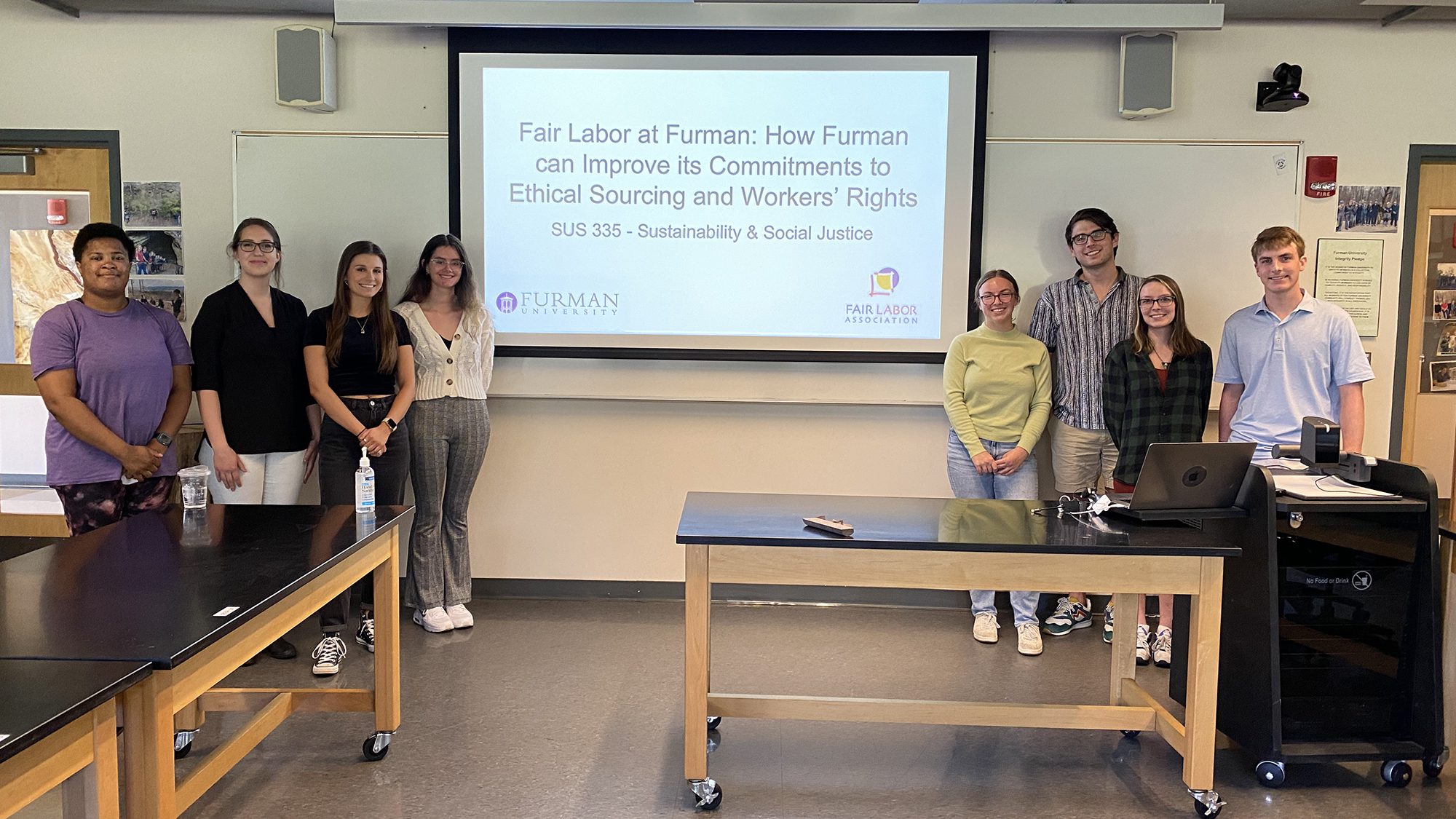of the university
Furman rejoins the Fair Labor Association

Furman’s entry into the Fair Labor Association makes it official: The companies licensed to produce t-shirts with the Furman logo will now receive training and guidance to improve the working conditions in their supply chains. This is a critical step toward a world with less child labor and more worker well-being.
The FLA is an organization that works with businesses, organizations and colleges and universities to advance workers’ rights and improve working conditions throughout the global supply chain by meeting international standards. With Furman’s FLA membership in July, the university joined about 140 academic institutions in North America, according to the organization’s website.
In Spring 2022, students of Geoffrey Habron, a professor of sustainability science at Furman, were learning about material sourcing, socially just practices within the supply chain and other aspects of manufacturing. They then researched organizations that track such information, such as the FLA.
At the same time, Furman was examining its own policies for corporate partnerships and licensing.
“An amazing collaboration developed that gave our students real-world experience and ultimately had a direct impact on the university’s decisions,” said Elizabeth Lichtenberg, senior director of brand strategy and visual communications. “It’s important for Furman to be a leader in socially just practices and great for our students to help shape the direction of the university. They made this happen.”
The students discussed licensing, purchasing and other considerations with four groups across campus: Auxiliary Services, The Shi Institute for Sustainable Communities, Furman Athletics and University Communications. After meeting with the FLA and studying the benefits of membership, Habron’s class presented its recommendation to Furman leadership – that the university rejoin the FLA – and their recommendation was approved. Furman had last been a member in 2016.
“The ultimate goal was to have Furman join the FLA again, but it was also for students to help contribute to these decisions,” said Elizabeth Santi ’23, one of the students involved in the project.
With its membership, Furman has access to a Fair Factories Clearinghouse platform, where collegiate licensees that supply the university with their products will register the location of the sites where their products are made. This makes it possible for Furman to have more visibility into the supply chains of its branded products, and it allows the FLA to identify factories and licensees that may be involved when third-party complaints are filed by workers or civil society organizations.
“This enables us really to be consistent, not just that you learned it in my class or another class or there’s a major,” said Habron. “Here’s a clear indication that Furman practices what we preach. That will be great for the outside world, for prospective students.”
In the course of their research, the students concluded that FLA membership serves as a “floor” for standards, and that a more comprehensive look at the supply chain would be warranted, because FLA does not differentiate levels within approved companies or products. For instance, said Habron, while Nike and Adidas are both FLA members, one is much more stringent and transparent.
“So, we hope that FLA membership begins the conversation to spur us to do more,” he said.
Since rejoining the FLA in July, any changes inside the Furman bookstore are unlikely to attract notice.
“There might be some (products) that go away, but the big ones when people walk in – Nike, Under Armour, Russell Athletic – they have enough money to pay and make sure they’re part of the FLA,” he said. Part of the research students were doing involved finding out how many people would be impacted by Furman’s membership. The FLA said smaller companies may be impacted because their work with Furman could be the first time they are asked to participate in training related to social compliance and to implement that training in their supply chains.
He pointed to parallels in organic food certification. While a small farmer might not use pesticides, the time and expense to get certified as an organic farm may be prohibitive.
“How are we going to help these companies become part of FLA?” said Habron. “It’s not a panacea. This just starts the conversation. You don’t want to exclude the small (businesses). That’s not sustainable either.”
This story was updated July 17 to clarify some of the FLA’s practices related to training and guidance for supply lines, how the Fair Factories Clearinghouse works and the impact on small companies.